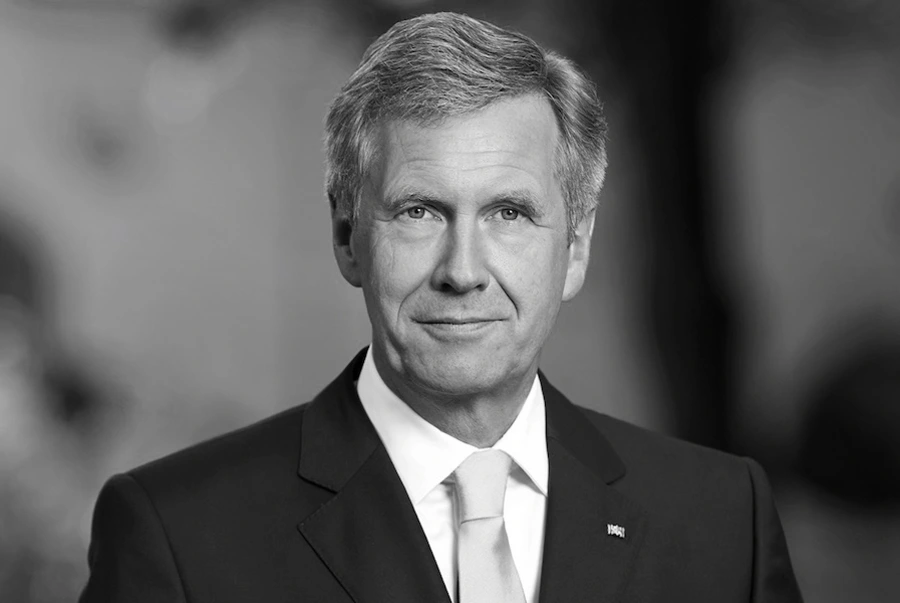Bundespräsident a.D. Christian Wulff
Winning in defeat
February 10, 2023
“One of the essential characteristics of democracy is that you can choose, you can win and you can lose. I don't want to overdo it, they all want to go home, but I've actually always learned more from defeats than from victories. And when I tell you that my appointment as Prime Minister was only successful at the third attempt after nine years, then it becomes clear that the Federal Assembly today was relatively short.”
These are sentences from Christian Wulff’s speech of thanks to the Federal Assembly immediately telbar after his election as Federal President on June 30, 2010 - after nine hours of Federal Assembly. Even then, Christian Wulff was obviously aware of the added value of defeats. In every loss there is also a gain and vice versa. Christian Wulff was one of the most popular politicians in Germany. At the peak of his political career, he experienced a painful crisis that also roused the whole country.
Defeats and crises still have a bad reputation in Germany. Failure is often associated with a shameful stigma. A look across the Atlantic reveals that another approach is also possible. Failed entrepreneurs are valued in the US and elsewhere because they have built resilience and gained vital experience. People who have experienced personal and professional failures have matured in a special way from circumstances or mistakes.
Samuel Beckett pursued failure almost as a hobby: "Always trying. Always failed. Doesn't matter. Try again. Fail again. It's better to fail." Crisis experiences can change attitudes towards life and towards fellow human beings. Values and the meaning of different aspects of life are reflected in a new way. As former Federal President, Christian Wulff shares his experience in his varied civil society, professional and international and experience how people develop their own strength and sometimes only regain it.
In a time that is characterized by multiple crises and that poses special challenges to societies worldwide, it is helpful to be able to fall back on inner resilience. This applies to an individual, but also to entire societies and states. Life is a rollercoaster ride of varying heights and speeds, a roller coaster ride. This should not be unsettling, it should arouse curiosity and sensitize people to remain open to new and unknown things. Even if things don't always go according to plan.
CHRISTIAN WULFF
As the 10th President of the Federal Republic of Germany (2010-2012), Christian Wulff (63) is particularly committed to the integration of people with a migration background and to interreligious dialogue. He maintains close ties to Asia and represents Germany in individual cases at international level. From 2003 to 2010 he was Prime Minister of Lower Saxony. From 1998 to 2010 he was deputy federal chairman of the CDU in Germany.
He is honorary chairman of the board of trustees of the Deutschlandstiftung Integration, president of the German Choir Association and patron of the German Multiple Sclerosis Society. He lives with his family in Burgwedel near Hanover and works in his law firm in Hamburg and his office as former Federal President in Berlin.
Photo Credit: Laurence Chaperone
Timeline
From 5.30 pm | Admission and Get-Together
6.30 pm -6.40 pm | Welcome by Korbinian Kohler
6.40 pm – 7 pm | Introduction by Prof. Dr. Wilhelm Vossenkuhl
7 pm – 7.45 pm | Keynote Speech by Guest Speaker
7.45 pm – 8.15 pm | Discussion
8.30 pm - midnight | Exclusive Gala Dinner
Hotel guests and external guests can attend the lecture free of charge until 7.45 pm, with a registration 24 hours in advance upon request and subject to availability
Accreditation Dinner
For the follow-up discussion and the exclusive dinner in an intimate setting, the speakers Professor Vossenkuhl and Korbinian Kohler will be present:
190 Euro per Person
Register with us at:
event(at)bachmair-weissach.com.
Maximum Number of Participants: 20 Guests


